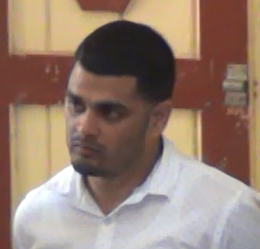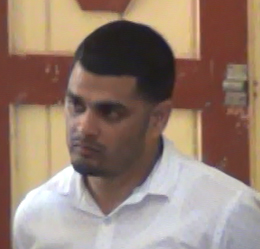It was only after the $941M alleged fraud at the Guyana Bank for Trade and Industry (GBTI) was reported to police and the Bank of Guyana that the Financial Intelligence Unit (FIU) began a review of information it had on the transactions of gold dealer Saddiqi Rasul and the Special Organized Crime Unit (SOCU) began investigations of money laundering, sources say.
“Through the (Guyana) Gold Board and the Bank (GBTI) the FIU was getting recommendations that the man was selling an extraordinary amount of gold and had large transactions,” a source close to the investigation told Stabroek News.
“With FIU… you do not know if they (are) acting on any of the information received because it is not like they say anything, but only after the fraud was reported that they requested more information and got actively involved,” the source added.

The source explained that FIU would not have red-flagged any of Rasul’s businesses because it progressed over time and seemed to be “above board”. Also it had the necessary documentation and paperwork required and no local commercial bank ever complained before of suspicions of money laundering or any other crime.
Also, while the Gold Board would have given its own required records of transactions, Rasul’s business was not the only one selling large amounts of gold as there are at least four other traders, who surpassed his totals.
“He was involved in the business of buying and selling gold and business from the paperwork side was above board,” the source said.
“It did not mean that because he was buying and selling large amounts of gold that he was involved in anything else…you have other dealers that sell more than that,” the source added.
Head of the Financial Intelligence Unit (FIU), Matthew Langevine last week declined to comment to Stabroek News specifically on the information the unit may have received about the Rasul matter, stating that he would not speak on specific cases.
“FIU’s role would be to receive information once there is a suspicious transaction”, he stressed adding that the FIU puts all the information together and analyzes it. On completion of this process, he said the matter is sent to SOCU if an offence was found to have been committed.
Rasul, the owner of SSS Minerals Trading, was on April 3 charged with six counts of fraud.
It was alleged that between March 21 and March 22, at Bartica, with intent to defraud, he obtained from GBTI $96 million, $290 million, $89 million, $45 million, $298 million and $138 million by falsely pretending that he had cash in a Citizens Bank account to honour cheques that he wrote.
He has denied the charges and is free on a total of $3M bail.
Banking perspective
A banking official explained to this newspaper that from the banking perspective, there seemed to be no evidence of money laundering and at worst it could have been a calculated attempt to defraud at least two city banks of large amounts of cash. “The issue there is the issue of fraud not money laundering”, the official stated.
It was explained that Rasul had good banking relations with the Citizens and GBTI banks where he operated on “large overdrafts”. Citizens Bank froze his accounts which an official has said “did not have any money in it” and was closed “simply because the bank did not believe that he had the money he was saying he had”. Citizens Bank reported no attempted fraud from its end.
“Simply put it is like this- If you came to me and say ‘I gave my mother my month’s salary but she is not in town, but give me the equivalent to that (and) when she returns I give you back. Your friend’s mother comes back and you go to the mother and she says, ‘who me? He ain’t give me no money’. Something like that happened.”
“It was all friends and family and interrelations, boyfriend and girlfriend relationships everything in one. It was like an incestuous relationship between the banks, employees and this man”, the source said.
This newspaper understands that Rasul’s main account was at the GBTI Bartica Branch. His main gold trading business was headquartered in the town. He would have often used the same overdraft system to access funds as the Bartica branch of the bank gave branches in the city the “go ahead” to release “hundreds of millions of dollars” in overdraft which was in the past repaid.
The $941M was the largest amount requested by Rasul.
The Bank of Guyana was immediately informed of the alleged $941M fraud as required by law.
“It is a requirement that whenever there is a fraud they have to immediately inform the Bank of Guyana. The BOG only comes into play when there is a fraud or there is a major issue or problem that would have been picked up inspectors or them themselves. It wasn’t an issue where the BOG was privy to anything else with this case but when something of this nature happened it did,” one source pointed out
“There aren’t any regulations that would require the banks to notify Bank of Guyana of large cash daily trades but when the fraud was picked up they would have promptly informed us. It is a requirement that anytime there is a fraud, however small or large, they have to inform us. The banks would notify FIU, and nothing here to do with Rasul per se, but if you are able to detect that there are unusual types of transactions happening. Here is where the bank of itself would have to come in and say ‘Hey we have noticed something unusual here’ and to protect themselves they would send that information to FIU. The man was above board but the bank wanted to safeguard itself,” the source noted.
Asked why billion-dollar transactions would not necessitate a bank red-flagging those transactions, the banker said that the business did not start out with that large amount but over time it grew in the size of transactions.
“It is just like an ordinary person that could have been involved in anything and when their business starts picking up, their back and forth starts increasing. There is no problem there”, the banker said.
The Bank of Guyana official made clear that the bank has no role in Gold Board operations. “We have nothing to do with Gold Board. It is only responsible for the commercial banks and what goes on there. We try to protect the public so when there is a fraud we have to take additional measures to ask the banks, ‘What are you doing now that there is a fraud? Are your internal systems in place or not?’”
In the case of the alleged GBTI fraud, precautionary measures were initiated the same day the fraud was reported, sources say.
Some measures include that a single branch manager cannot okay bank overdrafts and all cheques from external banks will have to be sent to the bank’s headquarters for additional approval.
“Immediately we start looking at what happened and the bank that uncovered the fraud had to start putting measures and has already started,” the source added.






